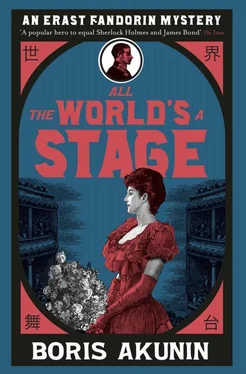‘Are you making fun of me? I don’t know how to write plays!’
‘In order to prove one’s love to a woman, it is necessary to perform feats of heroism. For such a man as you, overcoming a hundred obstacles or defeating a hundred wrongdoers is no great feat. But to compose a wonderful play for the sake of your beloved – that would be a genuine proof of love.’
Erast Petrovich sent his specialist adviser to the devil and was left alone again.
But the idea that had seemed idiotic at first kept running round Fandorin’s head and eventually beguiled him.
The gift given to the woman one loves should be the thing that brings her the greatest joy. Eliza is an actress. The theatre is her life. Her greatest joy is a good role. Ah, if only it really were possible to present Eliza with a play in which she would wish to act! Then she would stop looking at me with polite indifference. Masa has given me a very intelligent piece of advice. It is only a shame that it is quite impracticable…
Impracticable?
Erast Petrovich reminded himself of the many times in his life when he had encountered challenges that appeared insuperable at first. However, a solution had always been found. Will, intellect and knowledge were capable of overcoming any obstacle.
He had ample will and intellect. But knowledge was more of a problem. Fandorin’s familiarity with the business of playwriting was minimal. The task facing him was comparable to the heroic feats of Hercules. But he could at least try – for the sake of a goal such as this.
One thing was clear. It was unbearable not to see Eliza, but he must not appear before her as merely one more member of the grey crowd. He had already received one fillip to the nose, that was enough. If there was to be another encounter, he must present himself for it fully prepared.
And so the harmonious man moved on to the concluding stage – unswerving determination.
Erast Petrovich set about realising his purpose with comprehensive thoroughness. First he surrounded himself with books: collections of plays, monographs on dramatic art, treatises on stylistics and poetics. Fandorin’s skills of rapid reading and concentration, coupled with his feverish excitement, allowed the future dramatist to plough through several thousand pages in four days.
Fandorin spent the fifth day doing absolutely nothing, devoting himself entirely to meditating and creating an inner Void, which would give rise to the animating Impulse that people of the West call Inspiration and people of the East call Samadhi.
Erast Petrovich already knew exactly what kind of play he was going to write – the correct line to take had been prompted by the conversation with Stern about an ‘ideal play’. All that remained was to wait for the moment when the words would start flowing of their accord.
As evening was coming on, the inspiration-seeking Fandorin started swaying in a distinct rhythm and his half-closed eyelids opened wide.
He dipped a steel pen into an inkwell and traced out the long title. His hand moved slowly at first, then faster and faster, barely able to keep pace with the torrent of words that came bursting out. Time enveloped the study in a glimmering, undulating cloud. In the dead of night, with the regal full moon shining majestically in the sky, Erast Petrovich suddenly froze, sensing that the flow of magical energy had run dry. He dropped the pen, leaving a blot on the paper, leaned back in his armchair and finally fell asleep for the first time in days. The lamp carried on burning.
Masa entered the room soundlessly and put a warm rug over his master. He started reading what had been written and sceptically shook his large head, as round as the moon.
Seven 1s
UNTIL THE BENEFIT PERFORMANCE
THE VENGEANCE OF GHENGIS KHAN
She might as well not even go to bed. It was the same thing all over again: a face spattered with cabbage and a red beard surrounding lips that sang without making any sound.
In fact the dream always began very pleasantly, with her apparently driving along a country high road, not in an automobile, but in a carriage: the rhythmic clopping of hooves and jangling of harnesses, the gentle swaying of the springs sending sweet, visceral tremors surging upwards from below. No one there beside her, a mood so buoyant, she felt she could soar up into the air, her soul filled with a premonition of happiness, and she doesn’t want anything else at all. Just to keep on swaying like this on the springy seat and waiting for the joy that is already so close…
Suddenly there is a tap at the left-hand window. She looks – and sees a livid face with its eyes closed and scraps of cabbage dangling from its luxurious black moustache streaked with white. A hand with a signet ring on one finger adjusts the necktie and it starts wriggling. It isn’t a necktie, but a snake!
And then another tap – from the right. She jerks round, and there is the singer with the bright red beard. He looks at her soulfully, opens his mouth wide and even extends his arm in a fluent gesture, but she doesn’t hear anything.
Only the tapping on the glass: tap-tap-tap, tap-tap-tap!
At one time the dreams almost stopped. She wasn’t even very frightened when she saw that familiar bald spot and that glance blazing with hatred below the fused black eyebrows in the third row of the opera stalls at Poor Liza . She had known that he would turn up sooner or later, she was inwardly prepared for it and very pleased with her own self-possession.
But after the performance, when a snake’s head with exactly the same frenzied little eyes had suddenly thrust up out of the rosebuds, the nightmare had overwhelmed her again with even greater, more crushing force. If not for dear Nonarikin, so touchingly smitten with her… Brrrr, it was best not even to think about it.
For two days afterwards she had not allowed herself to sleep, knowing what it would lead to. On the third day tiredness got the better of her and, of course, the awakening was horrific. With screaming, convulsive sobbing and hiccupping. Since then it had been the same thing every night: the same old dream from St Petersburg, but now the snake had taken up residence in it.
In the dormitory of the ballet school, before she went to sleep little Liza often used to act out for her friends the stories of heroines who were dying. Either from slow-acting poison, like Cleopatra, or from consumption, like the lady with the camellias. Juliet killing herself with a dagger was suitable too, because before she finally stabs herself, she declaims a touching monologue. Liza enjoyed lying there with her eyes closed and listening to the girls sobbing. Later they all went in for dance and some even became well known, but a ballerina’s career is short, and Liza wanted to work in the theatre until her old age, like Sarah Bernhardt, and so she chose drama. She dreamed of collapsing lifelessly on the stage, like Edmund Kean, so that a thousand people would see it and sob, even though they thought it was all part of the role, and of drawing her final breath to the sound of applause and shouts of ‘Bravo!’
Liza rushed into marriage early. She was playing Princess Reverie (La Princesse Lointaine) to Sasha Lumpin’s enamoured Prince Geoffroi. Her first success, the first time she had felt the intoxication of universal adoration. In the season of youth it is so easy to confuse a play with real life! Of course, they separated very soon. Actors should not live together. Sasha faded away somewhere in the provinces, and all that remained of him was his name. But a leading lady cannot be called Liza Lumpina, and so she became Eliza Lointaine.
If her first marriage was simply a failure, the second turned out to be a catastrophe. Once again, she had only herself to blame. She was seduced by the dramatic flair of a sudden shift in the direction of life, by the tinsel and glitter of a superficial effect. And ultimately, by a resounding title. How many actresses had married simply so that they would be called ‘Your Excellency’ or ‘Your Ladyship’? But this had an even more grandiose ring: ‘Your Most Exalted Dignity’. That was the title by which the wife of a khan was supposed to be addressed. Iskander Altairsky was a brilliant officer in the Escort Lifeguards, the oldest son of the ruler of one of the khanates of the Caucasus, which had been annexed to the empire during the time of General Alexei Yermolov. He threw his money about and wooed her handsomely, he was good looking, despite his premature baldness, and in addition impetuous and voluble in the Asiatic manner. He declared that he was willing to sacrifice everything for the sake of love – and he kept his word. When his superiors refused him permission to marry, he resigned and abandoned his military career. He ruined his relationship with his father and renounced his rights of inheritance in favour of his younger brother; an actress, especially a divorced one, could not be the wife of the heir to a khanate. But the outcast was allocated a very decent annual allowance. And most important of all, Iskander swore not to make any difficulties over the theatre and consented to a childless marriage. What more could she have wished for? Her stage rivals were positively bursting with envy. Lida Yavorskaya, whose title by marriage was Princess Baryatinskaya, even emigrated from Russia – princesses were ten a penny in St Petersburg, but there was only one khatun.
Читать дальше









